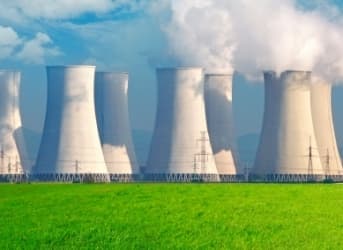This will be an unhappy new year for Vernon, a small town in the state of Vermont. It is losing its economic mainstay. The owner of its proud, midsized nuclear plant, which has sustained the community for 42 years, Entergy, is closing the plant. Next year the only people working at the plant will be those shuttering it, taking out its fuel, securing it and beginning the process of turning it into a kind of tomb, a burial place for the hopes of a small town.
What may be a tragedy for Vernon may also be a harbinger of a larger, multi-layered tragedy for the United States.
Nuclear – Big Green – is one of the most potent tools we have in our battle to clean the air and arrest or ameliorate climate change over time. I've named it Big Green because that is what it is: Nuclear power plants produce huge quantities of absolutely carbon-free electricity.
Related: Iran Optimistic About Nuclear Energy Deal And End To Sanctions
But many nuclear plants are in danger of being closed. Next year, for the first time in decades, there will be fewer than 100 making electricity. The principal culprit: cheap natural gas.
In today’s market, nuclear is not always the lowest-cost producer. Electricity was deregulated in much of the country in the 1990s, and today electricity is sold at the lowest cost, unless it is designated as “renewable” -- effectively wind and solar, whose use is often mandated by a “renewable portfolio standard,” which varies from state to state.
Nuclear falls into the crevasse, which bedevils so much planning in markets, that favors the short term over the long term.
Today’s nuclear power plants operate with extraordinary efficiency, day in day out for decades, for 60 or more years with license extensions and with outages only for refueling. They were built for a market where long-lived, fixed-cost supplies were rolled in with those of variable cost. Social utility was a factor.
For 20 years nuclear might be the cheapest electricity. Then for another 20 years, coal or some other fuel might win the price war. But that old paradigm is shattered and nuclear, in some markets, is no longer the cheapest fuel -- and it may be quite few years before it is again.
Markets are great equalizers, but they're also cruel exterminators. Nuclear power plants need to run full-out all the time. They can’t be revved up for peak load in the afternoon and idled in the night. Nuclear plants make power 24/7.
Nowadays, solar makes power at given times of day and wind, by its very nature, varies in its ability to make power. Natural gas is cheap and for now abundant, and its turbines can follow electric demand. It will probably have a price edge for 20 years until supply tightens. The American Petroleum Institute won't give a calculation of future supply, saying that the supply depends on future technology and government regulation.
Natural gas burns cleaner than coal, and is favored over coal for that reason. But it still pumps greenhouse gases into the atmosphere, though just about half of the assault on the atmosphere of coal.
The fate of nuclear depends on whether the supporters of Big Green can convince politicians that it has enough social value to mitigate its temporary price disadvantage against gas.
Related: The Global Energy Security War
China and India are very mindful of the environmental superiority of nuclear. China has 22 power plants operating, 26 under construction, and more about to start construction. If there is validity to the recent agreement between Chinese President Xi Jinping and President Barack Obama, it is because China is worried about its own choking pollution and a fear of climate change on its long coastline, as well as its ever-increasing need for electricity.
Five nuclear power plants, if you count Vermont Yankee, will have closed this year, and five more are under construction in Tennessee, South Carolina and Georgia. After that the new plant pipeline is empty, but the number of plants in danger is growing. Even the mighty Exelon, the largest nuclear operator, is talking about closing three plants, and pessimists say as many as 15 plants could go in the next few years.
I'd note that the decisions now being made on nuclear closures are being made on economic grounds, not any of the controversies that have attended nuclear over the years.
Current and temporary market conditions are dictating environmental and energy policy. Money is more important than climate, for now.
By Llewellyn King
Source - http://www.whchronicle.com/
More Top Reads From Oilprice.com:
- China’s Nuclear Power Gamble Is Mind-Boggling
- End Of Life Costs For Nuclear Power A Real Concern
- China And US Agree Ambitious New Emissions Deal



















However, I've not seen evidence that nuclear advocates have ever planned for the long term. Costs for long-term (i.e., thousands of years?) safe storage of waste and decommissioned plants are never included in "cost-competitiveness" analysis for nuclear.
Those inclined to agree with assessing CO2 emissions of gas/coal/oil power plants as pollution also argue against externalizing the cost of those emissions.